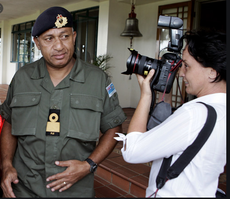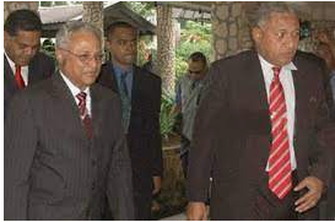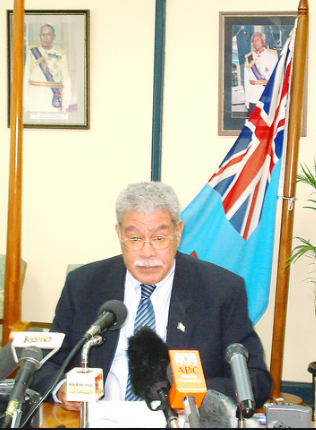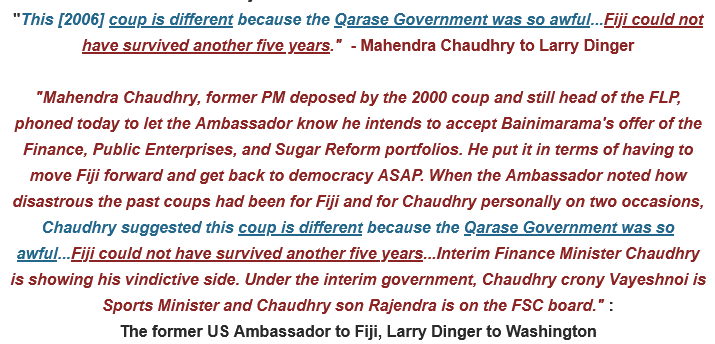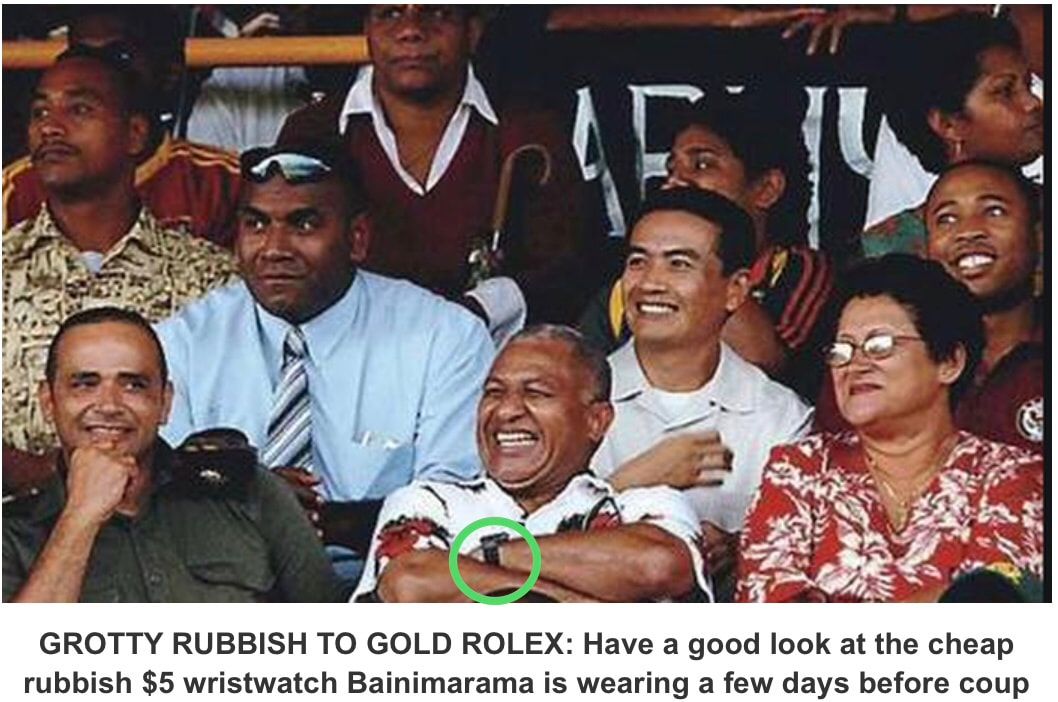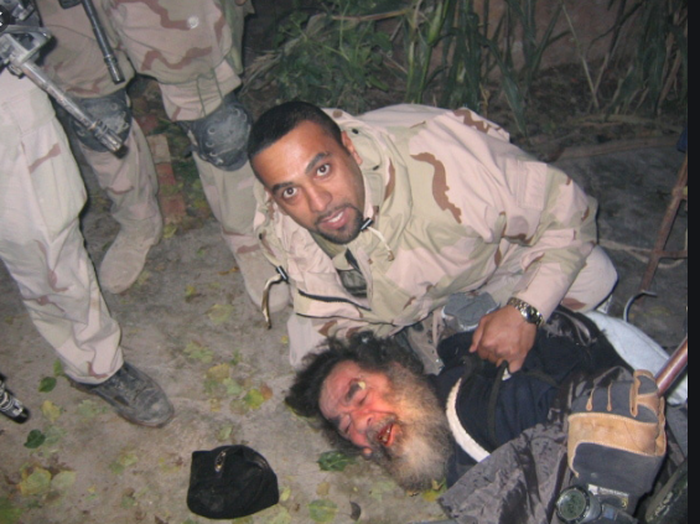Fijileaks to the Biden Administration: Tell BAINIMARAMA TO GET LOST
Kubuabola has no legal authority in international law to summon Gruebel. The US has a thick FILE on the treasonous coupist Bainimarama
[Police Commissioner Andrew] Hughes suggested Bainimarama should educate rather than threaten. The Commander said education wouldn't work.
The Fijian people "only respond to the stick from us."
"The secret report of a late-February conversation between Fiji Police Commissioner Hughes (protect) and Republic of Fiji Military Forces (RFMF) Commander Bainimarama is worrisome reading, with Bainimarama signaling he is willing to remove Prime Minister Qarase and place himself in power if the PM and his party win re-election in May and continue their present course...Hughes concludes that Bainimarama is distorting and exaggerating the Fiji situation in describing what he sees as a duty to the nation that transcends democratic principles and processes. Hughes reportedly warned the Commander that he is contemplating "treason," which would bring him into conflict with the police, the courts and the international community. Bainimarama dismissed such "by the book" concerns as not applying to the Fiji context. He added that he does not care about a possible loss of aid from Australia, the United States and New Zealand."
Larry Dinger to Washington, April 2006
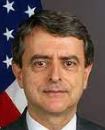 Larry Dinger
Larry Dinger Classified By: Ambassador Larry Dinger.
Summary 1. The secret report of a late-February conversation between Fiji Police Commissioner Hughes (protect) and Republic of Fiji Military Forces (RFMF) Commander Bainimarama is worrisome reading, with Bainimarama signaling he is willing to remove Prime Minister Qarase and place himself in power if the PM and his party win re-election in May and continue their present course. Hughes noted (as we have) that the Commander's views in a conversation often vary from benign to a sense that military intervention is nearly inevitable. Hughes concludes that Bainimarama is distorting and exaggerating the Fiji situation in describing what he sees as a duty to the nation that transcends democratic principles and processes. Hughes reportedly warned the Commander that he is contemplating "treason," which would bring him into conflict with the police, the courts and the international community. Bainimarama dismissed such "by the book" concerns as not applying to the Fiji context. He added that he does not care about a possible loss of aid from Australia, the United States and New Zealand. Hughes sees a "strong possibility" of a coup, if Qarase wins and doesn't alter course.
2. In other developments, Bainimarama led 200-400 armed troops in a "parade" through Suva on the day Fiji's Parliament went into pre-election dissolution. Our conversations with RFMF senior officers lately leave the impression the Commander has the support of his troops. In conversations with Bainimarama, the Embassy and senior visitors have made clear U.S. views of the proper civil-military relationship and have signaled the sort of negative consequences that would follow a coup. It is possible the RFMF's recent statements are bluff, intended to influence voters against Qarase and his party in the elections; but even that would be disturbing. We will continue efforts to convince military leaders to act in appropriately democratic fashion. Commander Bainimarama's Iraq-planning visit to Washington in late April will be another opportunity to reiterate USG views.
Fiji's fractured civil-military relations
3. We have received several indications in recent weeks that the Republic of Fiji Military Forces (RFMF) is seriously contemplating a coup if the current Qarase government is reelected and doesn't change course. Reftels lay out the fractured relationship between RFMF Commander Bainimarama and Prime Minister Qarase's government and indications that the RFMF might seek to remove the government if it continues to act contrary to the RFMF's view of the national interest.
Bainimarama drew two lines in the sand in February: if Fiji's Great Council of Chiefs selections in early March of Fiji's new President and Vice President were tainted by the 2000 coup (in the end the GCC reselected the incumbents, fine with the RFMF) or if constitutionally required elections in 2006 are flawed. Bainimarama has since qualified the elections issue, saying the RFMF believes the elections will inevitably be manipulated by the Qarase government and will not be free and fair; however, the new government may be given a chance to perform appropriately: to set aside flawed reconciliation and fishing-rights bills; to turn away from "racist/nationalist" politics.
Added evidence of RFMF "coup" contemplation
4. We received on March 30 a copy of a "secret" memo Fiji Police Commissioner Andrew Hughes (protect) wrote after meeting with Commander Bainimarama on February 27. Admittedly the memo is a month old, but Hughes told an interlocutor on March 30 he considers it still accurate. (Hughes, an Australian Federal Police officer on secondment to Fiji, is home on holiday for two weeks, so we cannot follow up at the moment. We have known him to be a solid, professional policeman with excellent judgment.) In recent months, relations between Hughes and Bainimarama, which appeared relatively close seven months ago, have clearly become strained. The Feb. 27 meeting did not help matters. Hughes portrayed an erratic Bainimarama surrounded by a compliant officers corps that is feeding the Commander's sense of righteous grievance against the Qarase government.
Frank Bainimarama railed against the "evil, corrupt, cannibalistic" Qarase government
5. Hughes attempted unsuccessfully to allay Bainimarama's concern that the police were gearing up to confront the army. The conversation then broadened to the RFMF's Pakistan-like "doctrine of necessity," put forth as justification for potential military action against the government (ref A). Bainimarama railed against the "evil, corrupt, cannibalistic" Qarase government and expressed regret for putting Qarase in power during the events of 2000. He said he should have retained power himself, for 5, 10, even 40 years. Now, if he must remove the distasteful Qarase government, he would not appoint an interim government but would rule by himself. Bainimarama discussed three possible flashpoints. First was the March president and vice president selection process (now OBE). Second would be re-election of the Qarase government. Bainimarama said he "would not tolerate regression back to ethno-nationalism." Third, if the Indo-Fijian-dominated Labor Party wins the election and civil disorder results, the military would step in to restore order (seemingly to buttress the government, not to remove it).
"Coup as catastrophe" argument falls on deaf ears
6. Bainimarama rejected Hughes view that a military government would be catastrophic for Fiji, suggesting that unnamed Indo-Fijian businessmen had told him Fiji could bounce back from another coup in 18 months. Bainimarama added that he does not care about international reaction, including the possible loss of aid money from Australia, the United States and New Zealand.
"Don't worry" v. "the stick"
Hughes suggested Bainimarama should educate rather than threaten. The Commander said education wouldn't work. The Fijian people "only respond to the stick from us."
7. Hughes noted (as we have) inconsistencies in Bainimarama's logic. He swung between saying "Don't worry, there won't be a military intervention" to implying a near inevitability of intervention no matter what happens at the polls. Hughes reported he told Bainimarama that removing the government "would amount to treason." The police, the courts, and others would be compelled in turn to take action against him. Bainimarama dismissed this as "doing it by the book," which would not work under the circumstances. Hughes suggested Bainimarama should educate rather than threaten. The Commander said education wouldn't work. The Fijian people "only respond to the stick from us." When Hughes raised practical issues for his police under a coup scenario, including for personal-protection officers who might be caught in the middle, Bainimarama responded: "as long as they didn't get in the way, they would be all right." The Hughes memo notes that the police would be powerless to prevent a takeover.
Lines have been drawn
8. In conclusion, Hughes painted a bleak situation in which "the lines have been drawn." Hughes alleged the Commander is "distorting and exaggerating" the situation in Fiji to suit his own agenda. He sees a duty to protect the nation in a role that "transcends democratic principles and processes." He professes not to want to intervene militarily, but unless the government and Great Council obey his demands, he will take over. He will not listen to contrary views and is underestimating or ignoring the repercussions of a coup. Hughes concludes that Bainimarama is prepared for a military takeover, and there is a strong possibility this will occur if Qarase is returned to power in May and pursues policies that offend the Commander's sense of what is right. Hughes ends by judging that the RFMF is not as strong nor as well-led as in 1987 (Fiji's first coups). In any coup attempt, factions would occur. Hughes predicts any military government would be inherently unstable, which would lead to bloodshed and, inevitably, to that government's downfall.
Recent events: an RFMF march in the streets
9. In March, Bainimarama and his spokesmen injected themselves frequently into Fiji's political debate. On March 27, the day Parliament was dissolved to make way for the elections (May 6-13), the commander led some 200-400 (estimates vary) of his troops in a military "parade" across the capital city, passing by the Parliament compound. The soldiers and their leader dressed in camouflage and carried weapons. Bainimarama told the media the soldiers were doing "what soldiers should be doing - taking long walks, but this is a public display of reassurance to the public."
RFMF inner circle: support for the Commander
10. At a recent social event hosted by the Embassy DATT, the Ambassador talked at length with several of Commander Bainimarama's inner circle, stressing the importance of the military taking its appropriate place subordinate to the elected civilian leadership in a democracy. A few months ago, similar conversations with RFMF officers brought reasonably comforting responses: that the RFMF fully understood the lessons from 1987 and 2000: coups are a disaster for Fiji, and the nation "can not go down that road again." Now the responses are unsettling: that the Qarase government and its corrupt, racist policies are a disaster; the RFMF has a duty to protect Fiji's best interests; the Commander has the support of his troops; the RFMF does not want to act but will do so if necessary.
Comments
11. The Ambassador, the DATT, and senior-level visitors like PACOM Commander Fallon, CENTCOM Commander Abizaid, and MFO Director General Larocco have good relations with Commander Bainimarama. All have used interactions with the Commander in recent months to emphasize the U.S. view of civil-military relations. Bainimarama is certainly giving the impression that, despite such advice, he is prepared to remove the Qarase government, if that government is reelected in May and if it then does not immediately change course to policies that meet RFMF approval.
The realities that such a course would contribute to Fiji's "coup culture," would have severe economic consequences, especially for Fiji tourism, and would result in ruptured military relations, including cancellation of the U.S. Army Pacific PAMS conference which is now scheduled for Fiji in September, appear not to be major factors in Bainimarama's calculations. Such factors also do not seem to sway the senior officers we have been talking to lately.
12. It is conceivable that the rhetoric is just bluff, intended to influence the voting public to reject Qarase and his cohort in the elections. Bainimarama has backed away from extreme statements before, suggesting he had been misunderstood. Bainimarama and some of his senior officers have repeatedly tried to reassure us, saying "you don't need to worry." Still, Commissioner Hughes is clearly worried that the threats are not bluff.
We worry, too. We worry that the threats may be real, and we worry that, in any case, such threats will warp Fiji's electoral environment to the detriment of a free and fair election. We will continue to utilize opportunities to try to convince RFMF leaders to play their proper, limited role in Fiji's governance. Commander Bainimarama is planning to attend an Iraq planning conference in Washington later this month. That will be another opportunity for the USG to reiterate its views. DINGER
Summary 1. The secret report of a late-February conversation between Fiji Police Commissioner Hughes (protect) and Republic of Fiji Military Forces (RFMF) Commander Bainimarama is worrisome reading, with Bainimarama signaling he is willing to remove Prime Minister Qarase and place himself in power if the PM and his party win re-election in May and continue their present course. Hughes noted (as we have) that the Commander's views in a conversation often vary from benign to a sense that military intervention is nearly inevitable. Hughes concludes that Bainimarama is distorting and exaggerating the Fiji situation in describing what he sees as a duty to the nation that transcends democratic principles and processes. Hughes reportedly warned the Commander that he is contemplating "treason," which would bring him into conflict with the police, the courts and the international community. Bainimarama dismissed such "by the book" concerns as not applying to the Fiji context. He added that he does not care about a possible loss of aid from Australia, the United States and New Zealand. Hughes sees a "strong possibility" of a coup, if Qarase wins and doesn't alter course.
2. In other developments, Bainimarama led 200-400 armed troops in a "parade" through Suva on the day Fiji's Parliament went into pre-election dissolution. Our conversations with RFMF senior officers lately leave the impression the Commander has the support of his troops. In conversations with Bainimarama, the Embassy and senior visitors have made clear U.S. views of the proper civil-military relationship and have signaled the sort of negative consequences that would follow a coup. It is possible the RFMF's recent statements are bluff, intended to influence voters against Qarase and his party in the elections; but even that would be disturbing. We will continue efforts to convince military leaders to act in appropriately democratic fashion. Commander Bainimarama's Iraq-planning visit to Washington in late April will be another opportunity to reiterate USG views.
Fiji's fractured civil-military relations
3. We have received several indications in recent weeks that the Republic of Fiji Military Forces (RFMF) is seriously contemplating a coup if the current Qarase government is reelected and doesn't change course. Reftels lay out the fractured relationship between RFMF Commander Bainimarama and Prime Minister Qarase's government and indications that the RFMF might seek to remove the government if it continues to act contrary to the RFMF's view of the national interest.
Bainimarama drew two lines in the sand in February: if Fiji's Great Council of Chiefs selections in early March of Fiji's new President and Vice President were tainted by the 2000 coup (in the end the GCC reselected the incumbents, fine with the RFMF) or if constitutionally required elections in 2006 are flawed. Bainimarama has since qualified the elections issue, saying the RFMF believes the elections will inevitably be manipulated by the Qarase government and will not be free and fair; however, the new government may be given a chance to perform appropriately: to set aside flawed reconciliation and fishing-rights bills; to turn away from "racist/nationalist" politics.
Added evidence of RFMF "coup" contemplation
4. We received on March 30 a copy of a "secret" memo Fiji Police Commissioner Andrew Hughes (protect) wrote after meeting with Commander Bainimarama on February 27. Admittedly the memo is a month old, but Hughes told an interlocutor on March 30 he considers it still accurate. (Hughes, an Australian Federal Police officer on secondment to Fiji, is home on holiday for two weeks, so we cannot follow up at the moment. We have known him to be a solid, professional policeman with excellent judgment.) In recent months, relations between Hughes and Bainimarama, which appeared relatively close seven months ago, have clearly become strained. The Feb. 27 meeting did not help matters. Hughes portrayed an erratic Bainimarama surrounded by a compliant officers corps that is feeding the Commander's sense of righteous grievance against the Qarase government.
Frank Bainimarama railed against the "evil, corrupt, cannibalistic" Qarase government
5. Hughes attempted unsuccessfully to allay Bainimarama's concern that the police were gearing up to confront the army. The conversation then broadened to the RFMF's Pakistan-like "doctrine of necessity," put forth as justification for potential military action against the government (ref A). Bainimarama railed against the "evil, corrupt, cannibalistic" Qarase government and expressed regret for putting Qarase in power during the events of 2000. He said he should have retained power himself, for 5, 10, even 40 years. Now, if he must remove the distasteful Qarase government, he would not appoint an interim government but would rule by himself. Bainimarama discussed three possible flashpoints. First was the March president and vice president selection process (now OBE). Second would be re-election of the Qarase government. Bainimarama said he "would not tolerate regression back to ethno-nationalism." Third, if the Indo-Fijian-dominated Labor Party wins the election and civil disorder results, the military would step in to restore order (seemingly to buttress the government, not to remove it).
"Coup as catastrophe" argument falls on deaf ears
6. Bainimarama rejected Hughes view that a military government would be catastrophic for Fiji, suggesting that unnamed Indo-Fijian businessmen had told him Fiji could bounce back from another coup in 18 months. Bainimarama added that he does not care about international reaction, including the possible loss of aid money from Australia, the United States and New Zealand.
"Don't worry" v. "the stick"
Hughes suggested Bainimarama should educate rather than threaten. The Commander said education wouldn't work. The Fijian people "only respond to the stick from us."
7. Hughes noted (as we have) inconsistencies in Bainimarama's logic. He swung between saying "Don't worry, there won't be a military intervention" to implying a near inevitability of intervention no matter what happens at the polls. Hughes reported he told Bainimarama that removing the government "would amount to treason." The police, the courts, and others would be compelled in turn to take action against him. Bainimarama dismissed this as "doing it by the book," which would not work under the circumstances. Hughes suggested Bainimarama should educate rather than threaten. The Commander said education wouldn't work. The Fijian people "only respond to the stick from us." When Hughes raised practical issues for his police under a coup scenario, including for personal-protection officers who might be caught in the middle, Bainimarama responded: "as long as they didn't get in the way, they would be all right." The Hughes memo notes that the police would be powerless to prevent a takeover.
Lines have been drawn
8. In conclusion, Hughes painted a bleak situation in which "the lines have been drawn." Hughes alleged the Commander is "distorting and exaggerating" the situation in Fiji to suit his own agenda. He sees a duty to protect the nation in a role that "transcends democratic principles and processes." He professes not to want to intervene militarily, but unless the government and Great Council obey his demands, he will take over. He will not listen to contrary views and is underestimating or ignoring the repercussions of a coup. Hughes concludes that Bainimarama is prepared for a military takeover, and there is a strong possibility this will occur if Qarase is returned to power in May and pursues policies that offend the Commander's sense of what is right. Hughes ends by judging that the RFMF is not as strong nor as well-led as in 1987 (Fiji's first coups). In any coup attempt, factions would occur. Hughes predicts any military government would be inherently unstable, which would lead to bloodshed and, inevitably, to that government's downfall.
Recent events: an RFMF march in the streets
9. In March, Bainimarama and his spokesmen injected themselves frequently into Fiji's political debate. On March 27, the day Parliament was dissolved to make way for the elections (May 6-13), the commander led some 200-400 (estimates vary) of his troops in a military "parade" across the capital city, passing by the Parliament compound. The soldiers and their leader dressed in camouflage and carried weapons. Bainimarama told the media the soldiers were doing "what soldiers should be doing - taking long walks, but this is a public display of reassurance to the public."
RFMF inner circle: support for the Commander
10. At a recent social event hosted by the Embassy DATT, the Ambassador talked at length with several of Commander Bainimarama's inner circle, stressing the importance of the military taking its appropriate place subordinate to the elected civilian leadership in a democracy. A few months ago, similar conversations with RFMF officers brought reasonably comforting responses: that the RFMF fully understood the lessons from 1987 and 2000: coups are a disaster for Fiji, and the nation "can not go down that road again." Now the responses are unsettling: that the Qarase government and its corrupt, racist policies are a disaster; the RFMF has a duty to protect Fiji's best interests; the Commander has the support of his troops; the RFMF does not want to act but will do so if necessary.
Comments
11. The Ambassador, the DATT, and senior-level visitors like PACOM Commander Fallon, CENTCOM Commander Abizaid, and MFO Director General Larocco have good relations with Commander Bainimarama. All have used interactions with the Commander in recent months to emphasize the U.S. view of civil-military relations. Bainimarama is certainly giving the impression that, despite such advice, he is prepared to remove the Qarase government, if that government is reelected in May and if it then does not immediately change course to policies that meet RFMF approval.
The realities that such a course would contribute to Fiji's "coup culture," would have severe economic consequences, especially for Fiji tourism, and would result in ruptured military relations, including cancellation of the U.S. Army Pacific PAMS conference which is now scheduled for Fiji in September, appear not to be major factors in Bainimarama's calculations. Such factors also do not seem to sway the senior officers we have been talking to lately.
12. It is conceivable that the rhetoric is just bluff, intended to influence the voting public to reject Qarase and his cohort in the elections. Bainimarama has backed away from extreme statements before, suggesting he had been misunderstood. Bainimarama and some of his senior officers have repeatedly tried to reassure us, saying "you don't need to worry." Still, Commissioner Hughes is clearly worried that the threats are not bluff.
We worry, too. We worry that the threats may be real, and we worry that, in any case, such threats will warp Fiji's electoral environment to the detriment of a free and fair election. We will continue to utilize opportunities to try to convince RFMF leaders to play their proper, limited role in Fiji's governance. Commander Bainimarama is planning to attend an Iraq planning conference in Washington later this month. That will be another opportunity for the USG to reiterate its views. DINGER



